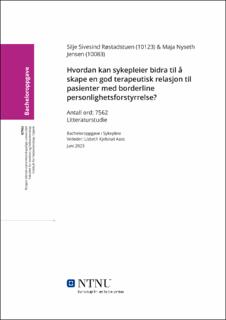| dc.contributor.advisor | Aass, Lisbeth Kjelsrud | |
| dc.contributor.author | Røstadstuen, Silje Sivesind | |
| dc.contributor.author | Jensen, Maja Nyseth | |
| dc.date.accessioned | 2023-07-15T17:19:55Z | |
| dc.date.available | 2023-07-15T17:19:55Z | |
| dc.date.issued | 2023 | |
| dc.identifier | no.ntnu:inspera:139585348:151284245 | |
| dc.identifier.uri | https://hdl.handle.net/11250/3079369 | |
| dc.description.abstract | Sammendrag
Bakgrunn: Pasienter med borderline personlighetsforstyrrelse opplever ofte dårlige holdninger fra sykepleiere. Holdninger er et viktig ansvarsområde innenfor sykepleie. I tillegg til dette har pasienter med borderline allerede utfordringer med tilknytningsevne og relasjonsbygging grunnet diagnosen.
Hensikt: Belyse hvordan sykepleier kan bidra til å skape en god terapeutisk relasjon til pasienter med borderline personlighetsforstyrrelse.
Metode: En litteraturstudie basert på kvalitative og kvantitative forskningsartikler. Studien inneholder sju forskningsartikler. Søket etter artiklene ble gjort i databasene Medline og Cinahl. Søkeordene vi brukte var: borderline personality disorder, borderline, nurse, nursing care, therapeutic relationship, therapeutic alliance, alliance og relation.
Resultat: Resultatene avdekket temaene holdninger, møte med pasienten, empati og bekreftelse, og kontinuitet og økt kunnskap.
Konklusjon: Litteraturstudien belyser at det eksisterer dårlige holdninger blant sykepleiere, og at dette kan være en barriere for å skape en terapeutisk relasjon. Metoder som ikke-dømmende holdning, aktiv lytting, se det helthetlige unike mennesket, bekreftende kommunikasjon, empati, mentalisering, kunnskap og medbestemmelse kan bidra til å etablere en god terapeutisk relasjon. Dette er verktøy som kan bidra til å skape en bedre arbeidsplass som er givende for både pasient og sykepleier. | |
| dc.description.abstract | Abstract
Background: Patients with borderline personality disorder frequently experience bad attitudes from nurses. Attitudes is an important responsibility within nursing care. In addition to this, patients with borderline already have challenges with attachment skills and relation building caused by the diagnosis.
Purpose: To enlighten how nurses can contribute to create a good therapeutic relationship to patients with borderline personality disorder.
Method: A literature studies based on qualitative and quantitative research articles. The study contains seven research articles. The search after the articles was done in the databases Medline and Cinahl. The search words we used was: borderline personality disorder, borderline, nurse, nursing care, therapeutic relationship, therapeutic alliance, alliance and relation.
Result: The results uncovered the themes attitudes, meet the patient, empathy and confirmation, and continuity and increased knowledge.
Conclusion: The literature study enlightens that bad attitude exists among nurses, and this can be a barrier to create a therapeutic relationship. Methods like non-judgmental attitudes, active listening, to see the whole unique person, affirmative communication, empathy, mentalization, knowledge and codetermination can contribute to establish a god therapeutic relationship. This is tools that can contribute to create a better workplace rewarding for both patient and nurse. | |
| dc.language | nob | |
| dc.publisher | NTNU | |
| dc.title | Hvordan kan sykepleier bidra til å skape en god terapeutisk relasjon til pasienter med borderline personlighetsforstyrrelse? | |
| dc.type | Bachelor thesis | |
